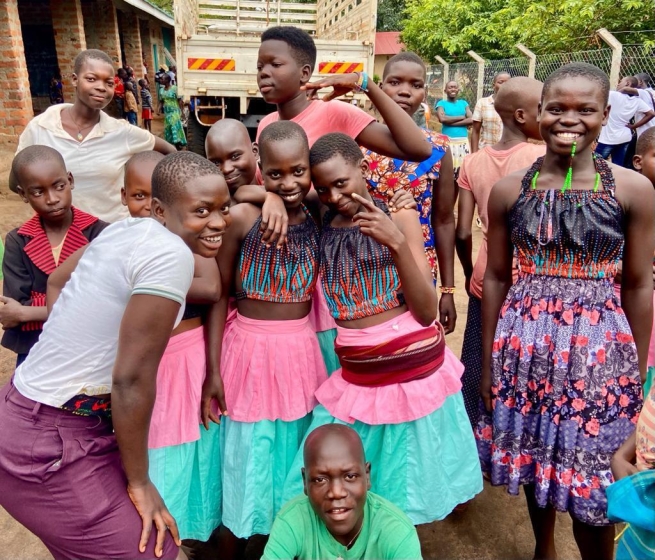Uganda is the African country with the largest number of refugee camps - 28 in total - for people from Ethiopia, Somalia, Congo, Rwanda, Burundi, and Sudan. A total of an estimated 1.7 million refugees reside in the country. In the specific case of Palabek, which belongs to the United Nations and covers an area of 400 square kilometers, some 72,000 people are housed there, mainly from South Sudan. About this reality, Br. Herrera spoke with the Salesian Bulletin of Argentina, giving a lengthy interview, which is reproduced below for ANS readers.
What is it like to live in a refugee camp? What is life like for people?
We Salesians have a small house; most people live in mud or thatched houses, but ours at least had sheet metal, electricity, and water. Until last year there were six Salesians from six countries: a Venezuelan, two trainees from Burundi and Uganda, a Congolese, an Indian, and me. It was a wonderful experience. Our daily life in the camp has been a surprise. The town where we buy food is 80 kilometers away, on a mountain road, and we have been eating what the people here eat, maize and beans. Then we have our house, which is kind of like a headquarters. Eight kilometers from the house is the school, which is for Vocational Training, the only one there. And then we engage in all the leisure activities: sports, theater, music. The most difficult thing for a refugee is to manage time because they often have nothing to do.
What is the hope, the expectation of a person living there?
Sudan, where the refugees come from, has only been independent for 11 years and is very insecure because the tribes are fighting each other. So those who come into the camp - mostly women - and manage to get the children educated, they don't want to go back. We Salesians have a program that allows children to go to secondary school outside the camp. The Salesian presence thinks about the future, about giving tools to the children so that they can achieve their objectives.
From what you tell, it sounds like the Salesian mission in Africa is very closely related to the daily lives of the people...
I really like this aspect of Salesian spirituality, this aspect of everyday life. We spend the whole day with the refugees in various activities: Vocational Training, agricultural projects, recreational activities like sports, music, dance, and we are happy with that. This is how we Salesians get closer to God. Don Bosco, in fact, was very clear that education is the best gift we can offer in Africa. He was not content to work with poor boys, but he wanted them out of the situation they were in because he believed they had a future.
In the face of such a difficult reality, how can faith be sustained?
I believe I have learned to pray since I have been in Africa because I have seen the commitment and conviction with which they pray. Two details caught my attention: the first is that they enter the church barefoot because they say it is a sacred, holy place. The second is that they cover their faces in front of the Blessed Sacrament. This stems from the Exodus, from Moses covering his face because of the too much light that prevented them from seeing.
And finally, their devotion to Mary should be emphasized. Especially in the countryside, they are very devoted to the Virgin. As Salesians, we work to spread devotion to Mary Help of Christians, who, as in Don Bosco's time, is the Mother who accompanies us in difficult times. I think this has a lot to do with the context of Africa, where women are the ones who run away with their children on their backs. You see they come on foot with the little ones; they come and they continue to take care of them. And then they remember a lot when Jesus arrived in Egypt; they celebrate it as the day of the refugees because Jesus was also a refugee; He was one of them.
Santiago Valdemoros and Juan José Chiappetti
Source: Salesian Bulletin of Argentina


